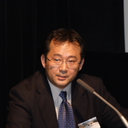Effect of mulberry leaf extract with enriched 1-deoxynojirimycin content on postprandial glycemic control in subjects with impaired glucose metabolism.
Sleutelwoorden
Abstract
Aims/Introduction: The glucose analogue, 1-deoxynojirimycin (DNJ), found in mulberry (Morus alba) leaves, is a promising α-glucosidase inhibitor. We evaluated the effect of the ingestion of mulberry leaf extract with enriched DNJ content on postprandial hyperglycemia in subjects with impaired glucose metabolism.
METHODS
In study 1, we carried out a randomized, double-blind, crossover trial to assess the effects of single ingestion of mulberry leaf extract (3, 6 or 9 mg DNJ) or placebo on blood glucose and insulin concentrations during 2 h after a carbohydrate (200 g boiled white rice) challenge in 12 subjects with fasting plasma glucose (FPG) in the range of 100-140 mg/dL. Study 2 was a randomized, double-blind, placebo-controlled trial to assess the efficacy of 12-week extract supplementation (6 mg DNJ, t.i.d.) for long-term glycemic control in 76 subjects with FPG in the range of 110-140 mg/dL.
RESULTS
In study 1, ingestion of the mulberry leaf extract led to attenuated postchallenge acute glycemia in a dose-dependent manner (P = 0.006, group × time interaction, two-way anova). In study 2, the serum 1,5-anhydroglucitol concentration, a sensitive indicator of postprandial glycemic control, in the extract group increased and was higher than that in the placebo group over the 12-week treatment period (P < 0.001, group × time interaction, two-way anova); no differences in FPG, glycated hemoglobin and glycated albumin concentrations were observed between the groups.
CONCLUSIONS
Long-term ingestion of mulberry leaf extract with enriched DNJ content could result in improved postprandial glycemic control in individuals with impaired glucose metabolism. These trials were registered with UMIN (no. UMIN000003154 and UMIN000003155). (J Diabetes Invest, doi: 10.1111/j.2040-1124.2011.00101.x, 2011).


